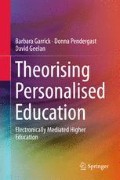Abstract
This chapter explores our own experiences as a means of exploring the tensions and constraints that arise when educators seek to foster (their own developing visions of) personalised learning in their pedagogical practices, within the contexts of degree-granting university courses. In telling those stories and reflecting on those experiences, we live the history of e-mediated learning, and reflect on the tendency towards programmed learning. Finally, we draw on the Productive Pedagogies (Mills et al. 2009) framework to analyse dimensions and issues important to a productive framing of this tension between personalised and programmed approaches to learning.
Access this chapter
Tax calculation will be finalised at checkout
Purchases are for personal use only
References
Coulson, J. E., & Mullin, A. A. (1963). Programmed learning and computer-based instruction. American Journal of Physics, 31(2), 147–148.
Darling-Hammond, L. (1997). The right to learn: A blueprint for creating schools that work. The Jossey-Bass Education Series: ERIC.
Dawson, V., Taylor, P., Geelan, D., Fox, R., Herrmann, A., & Parker, L. (1999). The development of epistemological pluralism through a web-based postgraduate curriculum course. Teaching in the Disciplines/Learning in Context, 99–102.
Furedi, F. (2013). The poverty of skills thinking in higher education. Teachers College Record. http://www.tcrecord.org. ID number: 17248, Date Accessed September 24, 2013.
Geelan, D. R. (2015). Open forums for teaching in an open online world. International Journal of Continuing Engineering Education and Life Long Learning, 25(1), 28–38.
Geelan, D. R., & Taylor, P. C. (2001). Writing our lived experience: Beyond the (pale) hermeneutic? Electronic Journal of Science Education, 5(4).
Geelan, D. R., & Taylor, P. C. (2004). Embodying our values in our teaching practices: Building open and critical discourse through computer mediated communication. Journal of Interactive Learning Research, 15(4), 375–401.
Hasselbring, T., Sherwood, R., Bransford, J., Fleenor, K., Griffith, D., & Goin, L. (1987). An evaluation of a level-one instructional videodisc program. Journal of Educational Technology Systems, 16(2), 151–169.
Hayes, D., Johnston, K., & King, A. (2006). The disruptive possibilities of looking in classrooms. Paper presented at the Australian association of research in education conference, Adelaide.
Lingard, B., Hayes, D., & Mills, M. (2003a). Teachers and productive pedagogies: Contextualising, conceptualising, utilising. Pedagogy, Culture and Society, 11(3), 399–424.
Lingard, B., Hayes, D., Mills, M., & Christie, P. (2003). Leading learning: Making hope practical in schools: Making hope practical in schools. Philadelphia, PA: McGraw-Hill Education (UK).
Lumsdaine, A. A., & Glaser, R. E. (1960). Teaching machines and programmed learning: A source book. Oxford, England: National Education Association.
McAuley, A., Stewart, B., Siemens, G., & Cormier, D. (2010). The MOOC model for digital practice. Online: Accessed November 12, 2015. http://www.davecormier.com/edblog/wp-content/uploads/MOOC_Final.pdf
McDonald, J. K., Yanchar, S. C., & Osguthorpe, R. T. (2005). Learning from programmed instruction: Examining implications for modern instructional technology. Educational Technology Research and Development, 53(2), 84–98.
Mills, M., Goos, M., Keddie, A., Honan, E., Pendergast, D., Gilbert, R., et al. (2009). Productive pedagogies: A redefined methodology for analysing quality teacher practice. The Australian Educational Researcher, 36(3), 67–87.
Papert, S. (1980). Mindstorms: Children, computers and powerful ideas. New York, NY: Basic Books.
Short, D. (2012). Teaching scientific concepts using a virtual world—Minecraft. Teaching Science, 58(3), 55.
Shute, V. J., Rieber, L., & Van Eck, R. (2011). Games… and… learning. Trends and Issues in Instructional Design and Technology, 3. Online: Accessed November 3, 2015. http://citeseerx.ist.psu.edu/viewdoc/download?doi=10.1.1.474.152&rep=rep1&type=pdf
Thalhimer, M. (1994). High-tech news or just shovelware?. Media Studies Journal, 8(1), 41–51.
Vygotsky, L. S. (1978). Mind in society: The development of higher psychological processes. Cambridge, MA: Harvard University Press.
Whitehead, J. (1989). Creating a living educational theory from questions of the kind, ‘How do I improve my practice?’. Cambridge Journal of Education, 19(1), 41–52.
Author information
Authors and Affiliations
Corresponding author
Rights and permissions
Copyright information
© 2017 Springer Nature Singapore Pte Ltd.
About this chapter
Cite this chapter
Garrick, B., Pendergast, D., Geelan, D. (2017). Personalised or Programmed? Current Practices of University Systems. In: Theorising Personalised Education. Springer, Singapore. https://doi.org/10.1007/978-981-10-2700-0_6
Download citation
DOI: https://doi.org/10.1007/978-981-10-2700-0_6
Published:
Publisher Name: Springer, Singapore
Print ISBN: 978-981-10-2698-0
Online ISBN: 978-981-10-2700-0
eBook Packages: EducationEducation (R0)

